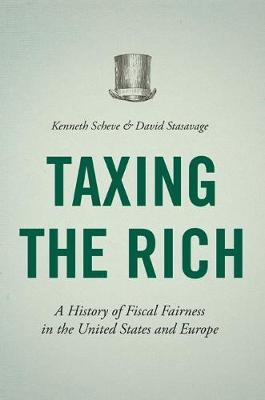
Taxing the Rich
Princeton University Press (Verlag)
978-0-691-17829-5 (ISBN)
In today's social climate of acknowledged and growing inequality, why are there not greater efforts to tax the rich? In this wide-ranging and provocative book, Kenneth Scheve and David Stasavage ask when and why countries tax their wealthiest citizens--and their answers may surprise you. Taxing the Rich draws on unparalleled evidence from twenty countries over the last two centuries to provide the broadest and most in-depth history of progressive taxation available. Scheve and Stasavage explore the intellectual and political debates surrounding the taxation of the wealthy while also providing the most detailed examination to date of when taxes have been levied against the rich and when they haven't. Fairness in debates about taxing the rich has depended on different views of what it means to treat people as equals and whether taxing the rich advances or undermines this norm. Scheve and Stasavage argue that governments don't tax the rich just because inequality is high or rising--they do it when people believe that such taxes compensate for the state unfairly privileging the wealthy.
Progressive taxation saw its heyday in the twentieth century, when compensatory arguments for taxing the rich focused on unequal sacrifice in mass warfare. Today, as technology gives rise to wars of more limited mobilization, such arguments are no longer persuasive. Taxing the Rich shows how the future of tax reform will depend on whether political and economic conditions allow for new compensatory arguments to be made.
Kenneth Scheve is professor of political science and senior fellow at the Freeman Spogli Institute for International Studies at Stanford University. He is the coauthor of Globalization and the Perceptions of American Workers. David Stasavage is Julius Silver Professor in the Wilf Family Department of Politics at New York University. He is the author of States of Credit: Size, Power, and the Development of European Polities (Princeton).
Figures and Tables xi Acknowledgments xiii PART ONE -DEBATING TAXATION 1. Why Might Governments Tax the Rich? 3 2. Treating Citizens as Equals 24 PART TWO -WHEN HAVE GOVERNMENTS TAXED THE RICH? 3. The Income Tax over Two Centuries 53 4. Taxing Inheritance 93 5. Taxes on the Rich in Context 114 PART THREE -WHY HAVE GOVERNMENTS TAXED THE RICH? 6. The Conscription of Wealth 135 7. The Role of War Technology 170 8. Why Taxes on the Rich Declined 185 9. What Future for Taxing the Rich? 206 Notes 219 References 247 Index 261
| Erscheinungsdatum | 03.01.2018 |
|---|---|
| Zusatzinfo | 20 b/w illus., 3 tables |
| Verlagsort | New Jersey |
| Sprache | englisch |
| Maße | 152 x 235 mm |
| Gewicht | 369 g |
| Themenwelt | Recht / Steuern ► Steuern / Steuerrecht |
| Sozialwissenschaften ► Politik / Verwaltung | |
| Sozialwissenschaften ► Soziologie | |
| Wirtschaft ► Volkswirtschaftslehre ► Wirtschaftspolitik | |
| ISBN-10 | 0-691-17829-1 / 0691178291 |
| ISBN-13 | 978-0-691-17829-5 / 9780691178295 |
| Zustand | Neuware |
| Haben Sie eine Frage zum Produkt? |
aus dem Bereich


